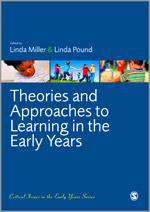Theories and Approaches to Learning in the Early Years
- Linda Miller - The Open University
- Linda Pound - Education Consultant
Included are chapters on:
- Froebel
- Psychoanalytical theories
- Maria Montessori
- Steiner Waldorf education
- High/Scope
- Post-modern and post-structuralist perspectives
- Forest Schools
- Vivian Gussin Paley
- Te Whatilderiki
Written in an accessible style and relevant to all levels of early years courses, the book has staggered levels of Further Reading that encourage reflection and promotes progression.
Linda Miller is Professor Emeritus of Early Years, The Open University
Linda Pound is a consultant and author, renowned for her work in early years education and care.
This is a good book for Level 4 and 5 students as an introduction to key thinkers and perspectives in early childhood.
This book has already become essential reading for the course I teach. Both I and the students have found it informative, easy to read and find the information needed.
I have found it is the book I am recommending to students who are looking to buy books. I have also requested it as a book for the college LRC so I can add it to my indicative reading list.
Structured well which gives readers an opportunity to understand theoretical approaches to learning. Text very useful for returning and exprienced practitioners. Plenty of opportunites for them to reflect on their practice.
This engaging book sets out clearly and accessibly, three key areas for analysis. Theoretical and analytical perspectives are closely referenced to key theorists, key historical influences on our early years education today are explored with a balanced rhetoric and this is complemented with a detailed analysis of more contemporary approaches. It will supplement and extend the reading for those students who wish to understand more, in depth, about the influences on early years practice.
As Linda Pound addresses the key figures, philosophies and ideas in early childhood education , this book will be thumbed through over and over again as it covers such a wide range of theory which will fit with a range of modules on an early years foundation degree.
Students wil find the reflective questions at the end of a chapter useful.
An excellent text that covers a large range of different theories and approaches to teaching in the early years. Good links to current practice and research.Each chapter provides indepth critical analysis of each approach. I would fully recommend this text to support students and practitioners with their studies.
Excellent book that addresses and informs on several of my units I am teaching on the Early Years Foundation degree and will be added to the booklist of recommended reading to my students in all years 1,2, & 3.
this book offers an overview of a variety of theories approaches to learning which students will find a beneficial addition to their library
A consistent and accessible format ensures that complex theories and perspectives are clearly outlined for readers. Readers are encouraged to evaluate theories and to question their influence on current practice and children's learning experiences.
Book is concise and well presented with easy to understand relevance to theory and practices.






